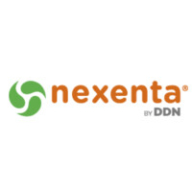


HPE StoreVirtual and Nexenta compete in the storage market. Nexenta appears superior in feature richness, whereas HPE StoreVirtual is often favored for cost-effectiveness and support.
Features: HPE StoreVirtual is known for scalability, integration capabilities, and strong hardware integration, making it suitable for hybrid IT environments. Nexenta offers advanced software-defined storage features, flexibility, and robust data management tools, focusing on software innovation and providing diverse storage solutions.
Ease of Deployment and Customer Service: HPE StoreVirtual provides a streamlined deployment process with comprehensive and reliable support, attracting businesses seeking simplicity. Nexenta has a more complex deployment process, trading complexity for flexibility, and is backed by technical expertise, which can be invaluable for businesses with specific needs.
Pricing and ROI: HPE StoreVirtual typically presents a more attractive pricing model, enabling quick ROI with lower upfront costs. Nexenta has higher initial setup costs but offers potential long-term savings by reducing operational expenses, focusing on delivering value through advanced features over time.
| Product | Market Share (%) |
|---|---|
| Pure Storage FlashBlade | 3.3% |
| Nexenta | 1.5% |
| HPE StoreVirtual | 2.2% |
| Other | 93.0% |



| Company Size | Count |
|---|---|
| Small Business | 11 |
| Midsize Enterprise | 11 |
| Large Enterprise | 21 |
| Company Size | Count |
|---|---|
| Small Business | 19 |
| Midsize Enterprise | 15 |
| Large Enterprise | 19 |
FlashBlade is the industry’s most advanced scale-out storage for unstructured data, powered by a modern, massively parallel architecture to consolidate complex data silos (like backup appliances and data lakes) and accelerate tomorrow’s discoveries and insights.
HPE StoreVirtual storage ensures that organisations can optimise the benefits of server virtualisation with cost-effective high availability and disaster recovery. The iSCSI-based, scale-out storage platform is easy to manage and change – meeting ongoing business demands without creating IT bottlenecks or application downtime. Overcoming the cost and management limitations of traditional storage area networks (SANs), HPE StoreVirtual nodes use storage clustering to form a single pool of resources that enable organisations to buy only what they need today, scaling non-disruptively to meet requirements in the future.
We monitor all Software Defined Storage (SDS) reviews to prevent fraudulent reviews and keep review quality high. We do not post reviews by company employees or direct competitors. We validate each review for authenticity via cross-reference with LinkedIn, and personal follow-up with the reviewer when necessary.